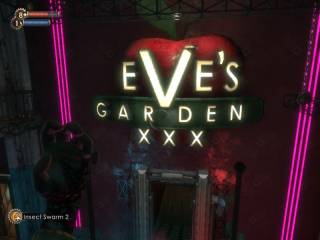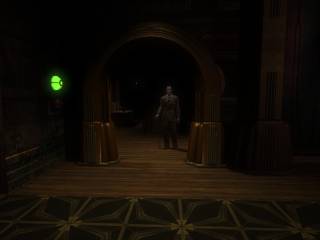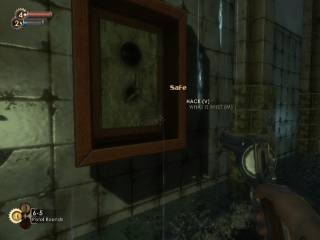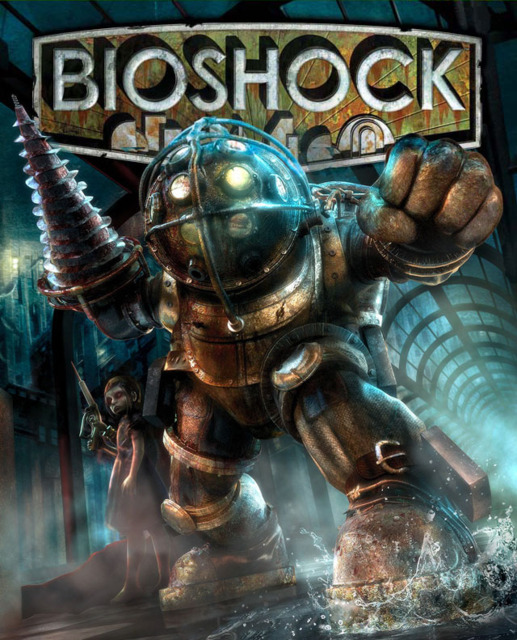A remarkably detailed, masterfully wrought political shooter.
Politics are old hat for video games, and have been for quite some time. Ever since Big Boss contemplated the soldier’s place in the world, games have worked meaningful political messages into their narratives. So it should not be surprising that BioShock, released in 2007, was able to achieve this task, and indeed, that alone is not very noteworthy. What is noteworthy, however, is how well the game does it. Not only is BioShock a complex, thought-out treatise on the dangers of objectivism and political extremism, but also a highly enjoyable first person shooter, the two concepts never feeling like they are at odds with each other.

One of the factors reconciling these two things is the game’s strong atmosphere. It all starts with the graphics. Even nearly six years after its initial release, the game looks fantastic. In fact, the only flaw seems to be an artistic one (the faces being too cartoony to take seriously), essentially meaning the game has reached technical perfection. Every object in Rapture is packed with detail, from the wood-grain floors to the frost emanating from Jack’s wrench. The lighting, too, is very strong; the strongest part of the game, perhaps. This, more than anything else, contributes to how immersive the game can be. Everything is bathed in a murky, stark sometimes unnatural darkness. Not only does this complete the defeated and collapsing feel for which BioShock strives, but it also lends key events a fun theatrical flair, further amplifying the unnatural feel of the underwater city.
It should not be surprising that this is all used to tell a detailed story about ideals butting heads with reality. It all begins with the protagonist serendipitously stumbling upon industrialist Andrew Ryan’s testament to objectivism: Rapture. Unfortunately, as it is, the city stands more as a testament against it than to it. Granted, the game can be incredibly blunt with this message, using its few beginning words to allude to the philosophies of Atlas Shrugged, but clearly, this is only because the developers have so much to say regarding the subject. Steinman’s section early in the game superbly juxtaposes the doctor’s ideals alongside his limitations; the city’s greeting of, “No gods or kings. Only man.” is quickly thrown out the window when Plasmids turn everybody into a demi-god; and as the various splicers clearly demonstrate, the “everyone for themselves” mentality the city so vehemently espouses breeds an environment in which nobody can be trusted. In fact, it is difficult to name a single character who succeeds and finds happiness within the system (rather than by exploiting its weaknesses).

Yet as Ryan himself clearly demonstrates, the writing never seems unduly biased against the philosophies it condemns. While he clearly commits immoral acts over the course of the game (murdering at least two women), this oddly never goes against what he preaches. Instead, he comes across more as a man dedicated to his ideals, even if this means abandoning a reality with which they are incompatible (an act he may not even be aware he is doing). He kills a woman for violating a business contract, for example, and seems to struggle balancing order in the city with the freedom he so highly values, eventually losing both in the process. All these facets somehow combine to transform Ryan into an inhuman yet somehow sympathetic figure. This also applies to the various other citizens of Rapture, as audio logs and incidental dialogue demonstrate throughout the experience. Politics aside, though, the tale of Rapture still has a lot to offer, whether from a thematic perspective (in the form of gender roles) or simply as a fun thrill ride (especially evident in the presence of the gleefully twisted Sander Cohen). Although not perfect, what with the unexplained supernatural elements and overly convenient plot points, it is still one of the best stories a video game has to offer.
Similarly, BioShock has more to offer than a good story. For instance, the shooting is very solid, employing the frantic fun that the genre is known for. The game offers a lot of weapons to play around with, from electric trip wires and proximity mines for methodical players to armor piercing machine guns and flamethrowers for those looking for a more visceral high. While the game’s staggering arsenal (nineteen ammo types spread across eight weapons) might overwhelm players initially, the incredible versatility of switching weapons on the fly ensures a smooth play experience. This much is necessary, too, given how many enemies can rush you at any given time. Enemies can jump at you from literally anywhere, requiring your utmost attention and quick reflexes to succeed. While the plot justification is shaky (how does Ryan have absolute control over these splicers?), the action is delivered consistently and frequently enough that you never really stop to think about it, instead taking it at face value as a rhythmic experience. (Oddly, this does not interfere with the story as a whole, as the chaotic shooting contributes greatly to the idea that Rapture continues to fall apart around you.)

Perhaps the only significant flaw with the game from a strict entertainment standpoint is its difficulty, or rather, the lack thereof. At first, this makes little sense, as all signs point toward BioShock being an engaging and challenging game, at least in short bursts. There are innumerable cases of ammo or health-restoring alcohol not being there when you need it, obviously meaning that death is a frequent companion within the halls of Rapture. Unfortunately, death is meaningless when Vita Chambers come into play. Mysterious chambers that revive you at absolutely no cost, they often remove any semblance of strategy in favor of merely brute forcing your way through tougher areas. After all, why plan things out carefully around an imposing Big Daddy when a nearby Vita Chamber will revive you for literally no cost? Compounding this, at least for PC players, is the clear focus on developing this game for consoles, giving mouse-and-keyboard players a clear advantage in many key situations, hacking being the most noticeable. The ability to click wherever at a moment’s notice seriously hampers any attempts at difficulty within these sections, placing the challenge more in getting to them than actually completing them. Those looking for challenge ought consider a console version with Vita Chambers permanently disabled.
Despite this, though, the shooting as a whole succeeds, and what really allows it to succeed is the rich customization that Plasmids offer. Like the ammo, there exists an incredibly wide variety of Plasmids, from pyrokinesis to one that makes hacking easier (somehow). Predictably, this, among other things, makes BioShock a game that invites multiple playthroughs, trying out different focuses and styles to working your way through Rapture. What isn’t immediately obvious, though, is the amount of strategy this can lend the game. Several Plasmids require you to take note of your environment for advantages, such as flammable oil slicks or hackable machines susceptible to an electric jolt. It should encourage premeditation in combat, but given how sudden many of the encounters can be, it is simply more likely to make these encounters go by more quickly and with a tactical flair While the justification for some Plasmids can definitely be shaky (there is one that allows you to shoot bees from your hands, the justification making no sense in several ways), the enjoyment gained from electrocuting a splicer does a good job of masking this.

Unfortunately, framing this excellent system is a mechanic that almost seems hell bent on undermining the game’s other achievements: moral choices. Yet there is nothing wrong with the concept of a moral choice in games. When done properly, they can enhance the story greatly and encourage multiple playthroughs, changing your perspective on how the narrative unfolds. BioShock only does one of those, and just barely; the only difference between saving a Little Sister (somehow) and harvesting her for her ADAM (literal numerical differences aside) is an alternate ending deeming you either the savior of the city or its destroyer.
Of course, the situation is clearly more complex than that. You could, for example, choose to interact with as few Little Sister as possible, or harvest as many Little Sisters as you save. Yet BioShock actively steers you away from these choices, forcing you into the moral conundrum early on and equating neutrality with malice. What this creates is a world where politics and survival (or at least what BioShock frames as survival) are boiled down to mere good and evil. Worse yet, the option BioShock deems “morally correct” is the option that directly goes against the morality Rapture builds up, amounting to nothing more than the writers saying that objectivism is evil. True, the game is very open about its criticisms of the political philosophy, but its arguments tend to be more nuanced and thought out than this. Such a shallow, reductive claim has absolutely no place in a game such as this.
This may be because the rest of the game is so effectively executed that this transgression is as offensive as it is. After all, in a bad game, this would be just another reason why is is bad, rather than the glaring flaw it is for a fantastic game like BioShock. Yet this flaw may be the only significant deal breaker in the package, given the quality of everything else in the game. Even nearly six years after its initial release, from the chaotic shootouts to the murky world forgotten at the bottom of the ocean, it is clear why BioShock has garnered the critical claim that it has.
